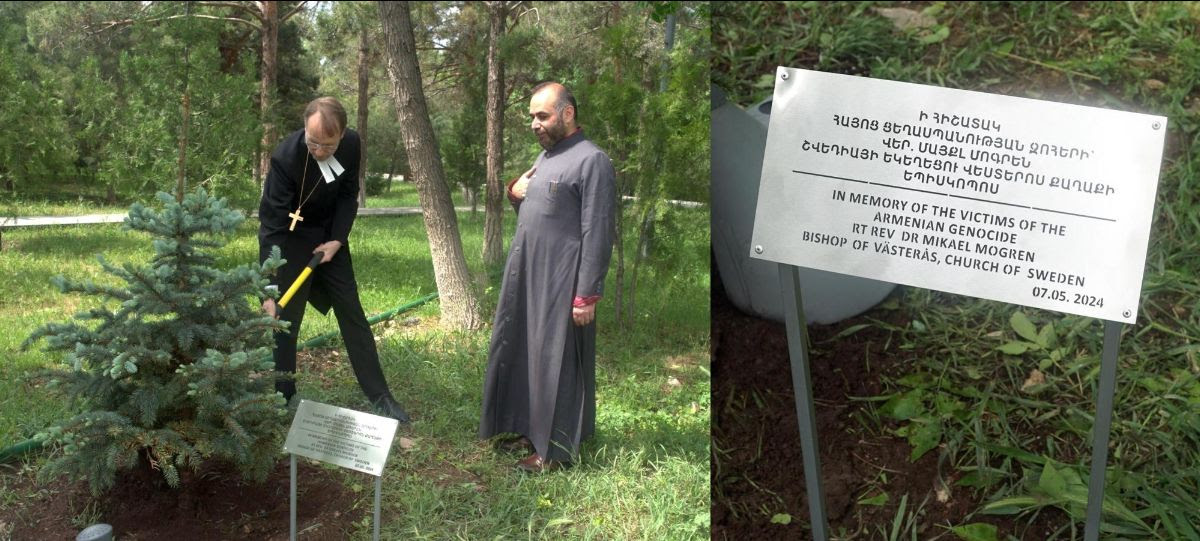World outlook, local ties Mogren took with him to Armenia strong ties from Sweden—ties he’s had since he was a child. “When I was a young man, I realized our churches are very similar,” he said. “We have a similar tradition. Our churches have a history of lay people in leading positions and in governing boards. Lay people play a strong role even in the traditional liturgy of our churches.” He added: “We are national churches contributing to our countries with cohesion and worship.” Armenians also have a mixture of different cultures in their heritage. “I have that in my heart, too,” said Mogren. “And we have a long history of collaboration and influences.” In 1901, the Missionary Society of Swedish women sent Alma Johansson to Mush (Western Armenia), where she stayed until December 1915. There she worked for the German Hilfsbund-Orphanage for Armenian children. At the outbreak of World War I, the atrocities against the empire's Christian minorities escalated and she became an eyewitness to these crimes against humanity. She wrote about her experiences in the book "A People in Exile: One Year in the Life of the Armenians.” “She saw with her eyes the genocide—and she protested,” said Mogren. “She delivered worldwide news.” During his trip to Armenia, Mogren left a bouquet of flowers at a monument to Johansson. “And I planted a tree,” added Mogren, who regarded the act of planting as both an honor and a duty. “They have a little forest of trees that represents the victims of genocide.” Spreading the word Now back in Sweden, Mogren is still spreading the word about the plight of refugees, the hope churches provide, and the precious history of Christianity in Armenia. “I did my journey with a journalist from Sweden,” explained Mogren. “He’s a man whose stories were aligned with my heart, so called him even though we had never met, to say ‘will you join?’ And he joined me.” Now, the journalist is producing a lot of media, Mogren said with appreciation. “At the same time, I have activated my contacts in the Swedish government, and I’ve spontaneously, from my own side, been making reports,” he said. “I have a responsibility to spread the word.” Pray for open eyes Mogren asked for the World Council of Churches global fellowship to pray for open eyes among not only decision-makers but among everyone in the world who wants a wider perspective of Armenia. “They are our root system for the whole Christian culture,” he said. “Without these roots—without the cities and villages and monuments from the early Christian days—our Christianity would be different.” He urged people to care about the state of original Christianity. “We are coming from rich and dominating countries in the west,” he said. “Sometimes we in the west have the blindness of the privileged.” As Mogren tries to enhance the world view of others, his heart stays grounded in his local setting. He reflected on the legacy of Nathan Söderblom, the first clergyman to receive the Nobel Peace Prize. Söderblom was the Church of Sweden Archbishop of Uppsala from 1914 to 1931. “He gives me a lot of inspiration because his heart was in the local yet he could combine that with a wide perspective,” explained Mogren. “His ecumenism is very inclusive.” As Mogren meets immigrants who come to Sweden from the east, he regards them with gratitude. “These groups are an intense part of history in Sweden,” he said. “They are my friends and I share with them, and I get to understand their situations. My native place here in Sweden has a root system because of them—700 or 800 years has been filled out by immigrants coming from very old churches.” Church of Sweden Armenian Apostolic Church (Mother See of Holy Etchmiadzin) | 

No comments:
Post a Comment